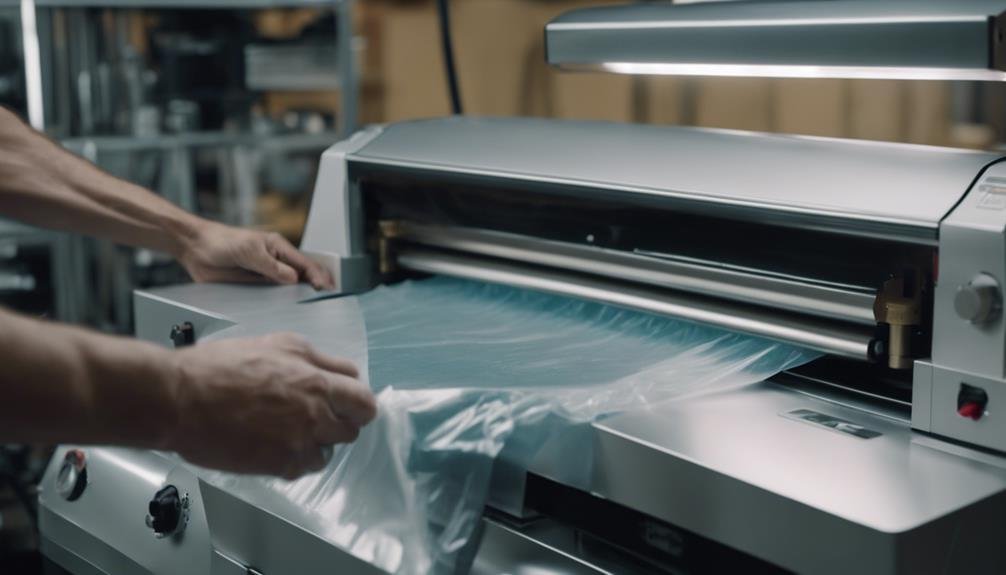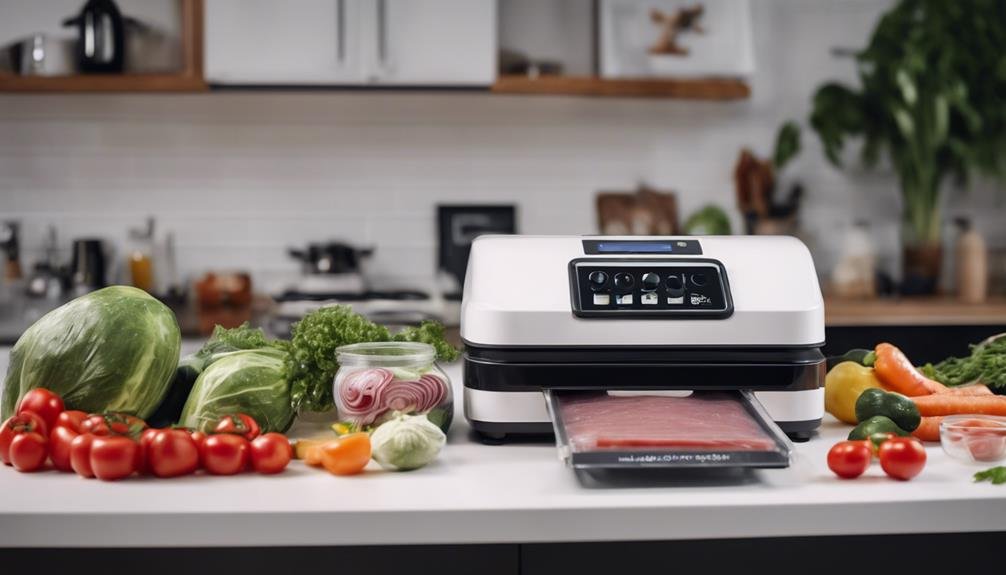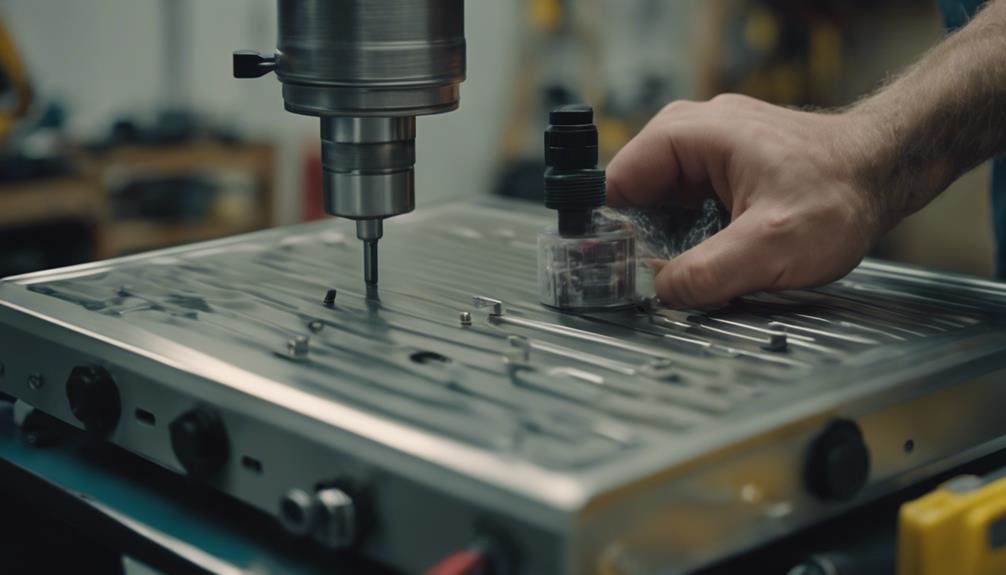To reduce noise in your vacuum sealing machine, consider placing it on sound-absorbing mats made from rubber or foam. Investing in high-end models with advanced noise reduction technology and sound-deadening liners can also help. These liners absorb vibrations and improve performance significantly. Opt for a fridge compressor or smaller, quieter compressors for a quieter sealing experience. Regularly lubricate moving parts, tighten loose screws, and keep spare parts for maintenance. Placing your machine on a folded tea towel can further dampen vibrations. By exploring these methods, you can create a quieter environment for your vacuum sealing machine.
Use Sound-Absorbing Mats
To reduce noise from your vacuum sealing machine, start by placing sound-absorbing mats or towels under and around it. These mats can be made from materials like rubber or foam, which effectively absorb and minimize the noise produced by your vacuum sealer. When the vacuum pump operates, it creates vibrations that can amplify the noise level. By placing these mats, you're creating a barrier between the sealer and the surface it sits on, absorbing the vibrations and greatly reducing the noise.
You can easily find sound-absorbing mats at hardware stores or online retailers. They offer a simple and cost-effective solution without requiring complex modifications or expensive upgrades to your vacuum sealing setup. Just make sure the mats are thick enough to provide proper cushioning and sound absorption.
Using sound-absorbing mats can make your vacuum sealing process much quieter, benefiting not only you but also anyone nearby who might be disturbed by the noise. This straightforward method helps you maintain a peaceful environment while efficiently using your vacuum sealer. So next time you set up your machine, don't forget to place these handy mats around it.
Opt for High-End Models
While sound-absorbing mats offer a simple solution, opting for high-end vacuum sealing models provides a more integrated approach to noise reduction. High-end models come equipped with advanced technology and engineering designed to minimize vibrations and noise. This makes them particularly ideal if you're looking for a quieter operation.
By investing in a premium vacuum sealer, you're not just paying for quieter performance; you're also securing a more pleasant user experience, especially in noise-sensitive environments. High-end machines often include sound-deadening liners, which are specifically designed to reduce the noise levels during operation. This feature alone can make a world of difference if you're sealing items in a busy kitchen or a small space.
To emphasize the benefits, consider the following comparison:
| Feature | High-End Models |
|---|---|
| Noise Reduction | Advanced |
| Sound-Deadening Liners | Included |
| Vibration Minimization | Superior |
| User Experience | Enhanced |
| Ideal for Noise-Sensitive | Yes |
Install Sound-Deadening Liners

Installing sound-deadening liners in your vacuum sealer can dramatically reduce noise by absorbing and dampening vibrations. These liners are specifically designed to tackle the resonance and vibrations that make your machine loud. Many high-end vacuum sealers already come equipped with these materials, but if yours doesn't, you can still make the upgrade.
Here are three key benefits of installing sound-deadening liners:
- Noise Reduction: By absorbing the vibrations, these liners greatly cut down on the noise level, making the operation much quieter. You'll find it similar to the noise reduction in high-quality dishwashers.
- Improved Performance: Less vibration means your vacuum sealer can operate more efficiently. The reduced noise isn't just for comfort; it can also indicate a smoother, more effective sealing process.
- Enhanced Longevity: Reducing the strain caused by vibrations can extend the lifespan of your vacuum sealer. Less wear and tear on the components means fewer breakdowns and repairs.
Investing in these liners isn't just about comfort; it's about improving your machine's overall performance and longevity. By installing sound-deadening liners, you can enjoy a quieter, more efficient vacuum sealing experience.
Try a Fridge Compressor
Consider using a fridge compressor as an alternative to the noisy membrane pumps in your vacuum sealer. Fridge compressors can greatly reduce the noise level during vacuum sealing operations, providing a much quieter experience. These compressors create a more silent vacuum pump, making them an excellent choice if you're tired of the loud noise typically associated with traditional vacuum sealers.
Fridge compressors are often found in commercial-grade models, which are generally more expensive. However, the investment might be worth it if noise reduction is a priority for you. While these models aren't commonly available in retail stores, they offer the benefit of a quieter sealing process, which can be particularly advantageous in a busy kitchen or commercial setting.
It's important to note that vacuum sealers with fridge compressors might be harder to find, but the significant noise reduction they offer makes them worth seeking out. You won't have to deal with the constant, loud humming of membrane pumps, allowing you to focus more on your work without the distraction of excessive noise. By opting for a vacuum sealer with a fridge compressor, you can enjoy a more pleasant and efficient sealing experience.
Choose Smaller Compressors

You might also want to look into vacuum sealers with smaller compressors to further reduce noise levels. These models, often found in commercial-grade options, are typically more expensive but offer several benefits. Smaller compressors are designed to be more efficient and quieter, making them a great choice for maintaining a peaceful kitchen environment.
Here's why you should consider vacuum sealers with smaller compressors:
- Noise Reduction: Smaller compressors operate more quietly compared to larger, louder pumps, providing a pleasant user experience.
- Efficiency: Despite their size, these compressors are highly efficient, ensuring that the sealing process is quick and effective.
- Commercial-Grade Quality: These models are usually built to last, offering durability and reliability, which can justify the higher cost.
Even though smaller compressors are rarer in domestic models, they provide a quieter alternative for those sensitive to noise. Investing in one can make a significant difference if you frequently use your vacuum sealer and prefer a quieter kitchen. While the upfront cost may be higher, the long-term benefits of reduced noise and increased efficiency can make it a worthwhile investment.
Position in Quiet Areas
Have you ever thought about placing your vacuum sealer in a quieter area to minimize noise disruptions? It's a simple yet effective strategy. Placing your vacuum sealer in a quieter corner of your kitchen, or a separate room, can greatly reduce the noise impact. But there's more you can do!
Vacuum sealers produce noise due to rapid vibrations from their pistons. This noise is often amplified by the machine's case. To counteract this, you can place a folded tea towel under and over the vacuum sealer. This helps absorb vibrations and reduces the noise level. Think of it like how high-end dishwashers use sound-deadening features to stay quiet.
Here's a quick table to summarize some tips:
| Action | Description | Benefit |
|---|---|---|
| Relocate | Move to a quieter area | Reduces noise disruptions |
| Use Tea Towels | Place under and over the machine | Absorbs vibrations |
| Combine Tactics | Relocate and use towels | Maximizes noise reduction |
Regular Maintenance Tips

Regular maintenance is key to keeping your vacuum sealer operating efficiently and quietly. By following a few simple steps, you can minimize noise and guarantee your machine performs at its best. First, regularly clean the sealing area and gaskets. Dirt and debris can cause improper sealing and increased noise.
Next, check for any worn-out or damaged parts. Replacing items like the sealing strip or gaskets prevents unnecessary noise during operation. It's a good idea to keep spare parts on hand for quick replacements.
Here are three essential maintenance tips:
- Lubricate Moving Parts: Apply lubricant to moving parts such as the piston or pump. This reduces friction and noise, ensuring smoother operation.
- Tighten Loose Screws: Over time, screws and components can loosen, leading to vibrations and increased noise levels. Regularly check and tighten them.
- Follow Manufacturer's Schedule: Adhere to the maintenance schedule recommended by the manufacturer. This helps catch potential issues early and keeps your vacuum sealer in peak condition.
Noise Reduction Accessories
In addition to regular maintenance, utilizing noise reduction accessories can greatly diminish the sound produced by your vacuum sealer. Start by placing your vacuum sealer on a folded tea towel. This simple technique absorbs vibrations and markedly reduces noise levels during operation. If you're dealing with a domestic-grade vacuum sealer, which typically uses a membrane pump known for its noisiness, this small adjustment can make a big difference.
For those willing to invest a bit more, consider more expensive brands or commercial units that come equipped with sound-deadening liners. These liners are specifically designed to minimize the noise produced by the machine, offering a quieter experience overall.
Another creative solution involves repurposing a fridge compressor as an alternative vacuum pump. Some users have found this to be a quieter option, though it requires a bit of DIY know-how.
If you're open to spending more, quieter vacuum sealers with small compressors are available in commercial-grade models. While they come at a higher cost, these units are designed to operate more quietly, making them a worthwhile investment for a serene kitchen environment.
Conclusion
By incorporating these noise reduction strategies, you can make your vacuum sealing machine much quieter. It is worth noting that studies show that reducing noise in the workplace can boost productivity by up to 66%. So, don't wait—opt for sound-absorbing mats, high-end models, or smaller compressors, and make sure to maintain your machine regularly. You'll not only create a more pleasant environment but also improve efficiency. Try some of these tips today and experience the difference!
